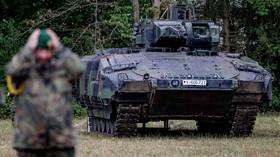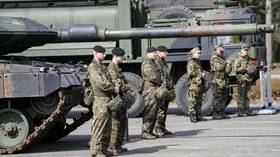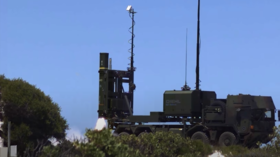Germany warns of ‘absolute deficit’ in weapons stocks

With German weapons stocks running low, the country’s defense industry should produce arms specifically for Ukraine, Foreign Minister Annalena Baerbock has said.
During an interview with ZDF broadcaster on Wednesday, the German minister was asked whether Kiev could win in the conflict with Russia.
“We don’t know that,” she replied, but promised that Berlin would “do everything possible” to help Ukraine.
However, Baerbock acknowledged that supplying Kiev with arms had become increasingly difficult for Germany as its own military was suffering from a shortage of equipment.
“Unfortunately, the situation here is such that we have an absolute deficit in our own stocks,” the Green Party politician said.
The German defense industry should therefore “produce hardware specifically for Ukraine,” instead of the country having to share weapons from its own arsenal.
Baerbock said she understood the desire of Vladimir Zelensky’s government to receive more arms, but insisted that Berlin also needed to think of the future. They must be prepared for the conflict in Ukraine to continue in 2023, she warned.
Germany’s Iris-T anti-aircraft missile system will be supplied to Kiev in the coming weeks, with more weapons deliveries expected by the end of the year, “so that the Ukrainians can defend themselves,” she stated.
Since the launch of Russia’s military operation in Ukraine six months ago, German Chancellor Olaf Scholz has faced criticism for his apparent reluctance to send weapons that were promised to Ukraine.
Berlin has so far supplied artillery pieces, shoulder-fired rockets, and anti-aircraft self-propelled guns, but not the more sophisticated air-defense systems and artillery radar hardware desired by Kiev.
Last week, Scholz reiterated that Berlin had been sending “a lot of weapons” to Kiev and would continue to do so. However, the chancellor also insisted that his main focus was “ensuring that there is no escalation” in Ukraine.
On Monday, the German Defense Ministry said it had reached the “acceptable limit” of what it could deliver to Kiev without depleting its own stockpiles.
Russia sent troops into Ukraine on February 24, citing Kiev’s failure to implement the Minsk agreements, designed to give the regions of Donetsk and Lugansk special status within the Ukrainian state. The protocols, brokered by Germany and France, were first signed in 2014. Former Ukrainian president Pyotr Poroshenko has since admitted that Kiev’s main goal was to use the ceasefire to buy time and “create powerful armed forces.”
In February 2022, the Kremlin recognized the Donbass republics as independent states and demanded that Ukraine officially declare itself a neutral country that will never join any Western military bloc. Kiev insists the Russian offensive was completely unprovoked.














